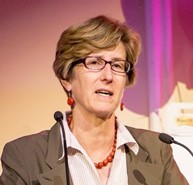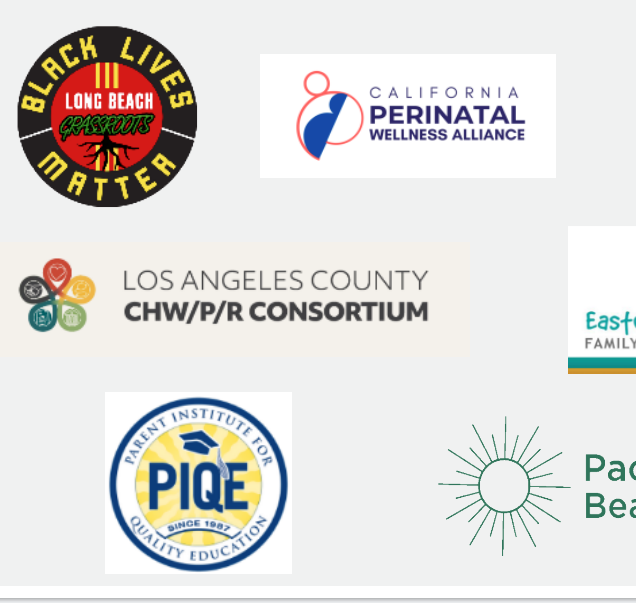As watchful eyes focus on how the White House and Congress transition to a new administration, what remains unclear is how these changes will steer early childhood priorities decided in Washington, D.C. that could impact child care, health, early education and more for families in every corner of the nation.
In the next year, Congress is expected to tackle the reauthorization of the Maternal, Infant and Early Childhood Home Visiting (MIECHV) program and the Children’s Health Insurance Program (CHIP). Meanwhile, President-Elect Trump has provided little information on any of his policy plans for children and families, with the exception of a proposal that would allow Americans to deduct child care from their taxes and incentivize employers to provide on-site child care services.
Despite the uncertainties raised by the changes in federal leadership, First 5 LA’s leaders remain certain of the importance of the agency’s mission to advocate in Washington, D.C., Sacramento and local government on behalf of Los Angeles County’s youngest constituents and their families.
“At First 5 LA, there are certain enduring truths that will not change.” – Kim Belshé
“Elections matter. Change in Washington, D.C. will occur, as it has in the past,” said First 5 LA Executive Director Kim Belshé. “At First 5 LA, there are certain enduring truths that will not change. Our vision for Los Angeles’ children – that throughout our diverse communities, all children are born healthy and raised in a safe, loving and nurturing environment so they grow up healthy in mind, body, and spirit, are eager to learn, with opportunities to reach their full potential – will not change.
“The values that reflect who we are and how we work – including collaboration, shared leadership, partnership, integrity, respect – will not change,” Belshé continued. “And First 5 LA’s approach to achieving results for children and their families – through direct services, policy and systems change, and diverse partnerships – will not change. It will be more important than ever for First 5 LA to further develop as an advocacy organization – to bring our voice and our smarts to inform and drive change in support of greater opportunity and better outcomes for young children.”
Meanwhile, First 5 LA’s leaders praised the passage of several state and local ballot measures and the election of leaders with a history of advancing positive outcomes for children.
“Here at home, we saw some important successes at the state and local ballot box that offer hope and promise for issues we care about, including approval of state ballot Propositions 55 and 56, which our Board endorsed, and local measures to support parks, public transit, and homelessness,” Belshé said.
Early Childhood Matters asked our legislative advocates and in-house policy experts for their thoughts about the elections and the future focus of early childhood advocacy.
.png) Post-Election Reflections:
Post-Election Reflections:
Sunil Mansukhani,
Principal, The Raben Group and First 5 LA Federal Advocate
Over the past several years, a bipartisan consensus has emerged, centered on the idea that we as a nation need to provide our 0-5 age group with adequate supports and growth opportunities to help them become productive adults down the road. This consensus is reflected in, among other things, overwhelming Congressional support for reauthorization of the Maternal, Infant, and Early Childhood Home Visiting Program (MIECHV), the Child Care and Development Block Grant Act, and the Elementary and Secondary Education Act, which included a focus on early childhood education for the first time since the law’s original passage in the 1960s. We have also seen the growth of quality Pre-K programs across this country under both Democrat and Republican leadership.
Moving forward, we need to emphasize the importance of providing quality services to our youngest children, given how much brain development occurs in the early years and how it provides a strong foundation for developing a prepared workforce. We also need to emphasize how early childhood priorities like developmental screening and trauma-informed care are good investments that save money for counties, states, and the federal government down the road due to a reduced reliance on other social services.
* * *
As Belshé noted, the elections also brought about a number of important results that drew praise from child advocates. These include:
 A U.S. Senator Who Is Also an Early Childhood Advocate
A U.S. Senator Who Is Also an Early Childhood Advocate
“Being smart on crime starts with ensuring our most vulnerable children can recover from trauma and violence in their homes and communities.” – Kamala Harris
In California and Los Angeles County, a number of races brought several early childhood supporters into office. One of the most prominent was the election of California Attorney General Kamala Harris, who replaces outgoing Senator Barbara Boxer in the upper house of the U.S. Congress. The first Indian American and second African American woman elected to serve in the United States Senate, Harris has been a longtime proponent of early childhood priorities. Her campaign platform calls for the prioritization of early developmental, behavioral, and dental screenings; the development of policies that support early literacy; and the nationwide development of universal pre-kindergarten.
In addition, the California Senator-Elect has been very active in highlighting the adverse impact of childhood trauma.
“Being smart on crime starts with ensuring our most vulnerable children can recover from trauma and violence in their homes and communities,” stated Harris in 2015. “All systems that interact with children and families — from the pediatrician’s and social worker’s offices to the classroom — must be held accountable for addressing childhood trauma.”
In 2015, Harris created the Bureau of Children’s Justice in order to ensure that California’s children were on track to meet their full potential. Under Harris, the California Department of Justice also joined the national Defending Childhood Initiative, which sought to ensure that children at-risk of Adverse Childhood Experiences (ACEs) were screened at school, during doctors’ visits, or when they become involved with child welfare and juvenile justice systems.
(1).jpg) Post-Election Reflections:
Post-Election Reflections:
Kim Pattillo Brownson,
Vice President Of Policy & Strategy, First 5 LA
First 5 LA’s mission is one premised on an audacious, bold type of love that recognizes that all of L.A. County’s children are valuable, deserve a fair shot in life, and indeed, are worth fighting for.
In the shadow of this election cycle, it’s worth remembering that First 5 LA too was borne out of a 1998 election when voters passed Proposition 10 and embraced the importance of young children. Our recent returns in local and state ballot measures reflect similar impulses, demonstrating L.A.’s willingness to invest in our community in terms of schools, health care, parks, homelessness and transit. Angelenos demonstrated not just grudging acceptance of the need for these vital services but record-breaking levels of support ranging from 57 to 76 percent.
First 5 LA aligns with this focus on our shared community of Los Angeles County: because our work is not about a certain group of kids, kids from certain neighborhoods or kids with a certain national lineage. A mission focused on dignity and equity is indeed a mission that is big enough for all of us.
Local Leaders Who Support Preschool, Child Welfare
In Los Angeles County, two of the most closely watched races were those to replace two retiring members of the L.A. County Board of Supervisors. Congressional Representative Janice Hahn was elected to the Fourth District, succeeding current Supervisor Don Knabe. As a member of Congress, Hahn’s track record includes support for affordable child care and early childhood education; in 2014, she co-sponsored the Strong Start for America’s Children Act, which would have provided funding to states for high-quality pre-kindergarten programs for children from low-income families.
“Quality affordable preschool and child care options are vital to the success of families in our communities,” Hahn noted during a 2014 visit to a child development center in Long Beach. “The children we met today are full of potential, and they deserve the best start we can offer so they can reach their goals down the road.”
Hahn has noted that among her top priorities are the implementation of universal preschool and the creation of more affordable housing.
In the Fifth District, Kathryn Barger defeated Darrell Park to replace current Supervisor Mike Antonovich. Barger, who previously served as Supervisor Antonovich’s Chief Deputy Supervisor, was endorsed by a number of officials, including former Supervisors Zev Yaroslavsky and Gloria Molina, and current Supervisor Sheila Kuehl. In its endorsement of Barger, The Los Angeles Times noted that she was likely to work well with the current Supervisors on a variety of issues, including homelessness, mental health and child welfare.
.jpg) Post-Election Reflections:
Post-Election Reflections:
Peter Barth, Director,
Policy & Inter-Governmental Affairs, First 5 LA
First 5 LA recognizes that local, state, and federal public policies significantly impact families with young children. California voters this year reaffirmed the need for public investment in key services and supports, including state measures to fund health and education and L.A. County measures to fund parks and transportation.
Moving into the new year, First 5 LA’s public policy goals will continue to focus on directing more of those resources to L.A. County’s youngest residents and their families and to make sure organizations that care about kids are aligned in their advocacy and policy priorities.
Ballot Measures That Increase Support for Health Care, New Parks and Housing Programs
In addition to elected officials, California voters supported various initiatives that will impact funding for programs and services relevant to children and families, including two state propositions endorsed by First 5 LA. Proposition 55 extends for 12 years the additional income tax rates originally established by Proposition 30 back in 2012. The measure is expected to raise up to $9 billion in annual revenue to fund both education and health care services
 Proposition 56 increases the state’s tax on cigarettes and other tobacco products by $2—from 87 cents to $2.87. The measure also raises the equivalent tax on other tobacco products, primarily electronic cigarettes.
Proposition 56 increases the state’s tax on cigarettes and other tobacco products by $2—from 87 cents to $2.87. The measure also raises the equivalent tax on other tobacco products, primarily electronic cigarettes.
A portion of the new taxes would backfill expected revenue losses to existing programs currently funded by a tobacco tax (breast cancer research, First 5s, and tobacco education). These revenue losses would occur due to lower consumption of tobacco products as a result of higher taxes. In addition, a portion of the new revenue from e-cigarettes would provide additional funding to these existing tobacco tax-funded programs. Up to $40 million per year in new revenues could be directed toward First 5 programs and services statewide (Proposition 10).
The remaining new revenues would be used for various purposes, including physician training; dental disease education, prevention and treatment; tobacco prevention and control programs; and spending increases for Medi-Cal programs and services. Revenue for these other activities is estimated to range between $1 billion and $1.4 billion.
In addition to the various state measures, L.A. county residents voted on a number of county and city measures. Among the passing propositions was the City of L.A.’s Measure A, which will institute a 1.5 cent per square foot parcel tax to help pay to build new parks and maintain existing ones across the County. The passage of this measure is expected to net the county about $94.5 million yearly.
Measure A has the potential to complement the work done by First 5 LA through its focus on Places and Spaces. In its 2015-2020 Strategic Plan, First 5 LA recognized that communities with access to quality open spaces and places such as parks, safe streets and transportation all contribute to a healthy neighborhood for young children and their families. As a result, the organization is working to strengthen the capacity of existing advocacy groups to work with communities to create new or improved physical spaces and places for families and children prenatal to age 5, with a priority focus on Best Start Communities.
.jpg) L.A. County voters also approved Measure M, which implements a half-cent sales tax increase to fund transportation projects over the next four decades. The measure is expected to generate $120 billion to help fund new rapid transit lines, bicycle and pedestrian connections, rail projects, and others. The lack of adequate public transportation has been a concern of many residents in Best Start communities. Projects funded through the measure have the potential to improve communities’ access to health care, schools and other vital resources.
L.A. County voters also approved Measure M, which implements a half-cent sales tax increase to fund transportation projects over the next four decades. The measure is expected to generate $120 billion to help fund new rapid transit lines, bicycle and pedestrian connections, rail projects, and others. The lack of adequate public transportation has been a concern of many residents in Best Start communities. Projects funded through the measure have the potential to improve communities’ access to health care, schools and other vital resources.
In the City of Los Angeles, voters overwhelmingly approved Measure HHH, which authorizes the City to issue $1.2 billion in general obligation bonds for homeless services. According to a 2012 study, at least 3,000 children ages 0-5 in L.A. County are homeless. The measure authorizes the city to use the funds raised to buy, build or remodel facilities to provide supportive housing for homeless individuals and families, where services such as health care, mental health, education and job training may be provided. Funds raised through the measure would also be used for temporary shelters and facilities, and for affordable housing people and people at risk of becoming homeless and to fund facilities that provide mental health care, addiction treatment, and other services.
First 5 LA has helped lead a pioneering effort to provide housing for homeless families with young children through permanent supportive housing, partnering with a number of local agencies and organizations in a five-year effort that will culminate in the construction of five housing facilities in the county.
Partnering, Organizing and Advocating for the Future
“Organizing and advocacy matter.” – Kim Belshé
As First 5 LA moves forward in the wake of this month’s elections, Belshé emphasized that the agency will not be alone in its journey to ensure that children in L.A. County enter kindergarten ready to succeed in school and life.
“Organizing and advocacy matter,” Belshé said. “The good news is that we are not alone in this effort. Our commitment to collaboration and partnership is more important than ever at this moment in time.
“To quote Helen Keller: ‘Alone we can do so little; together we can do so much.’”






